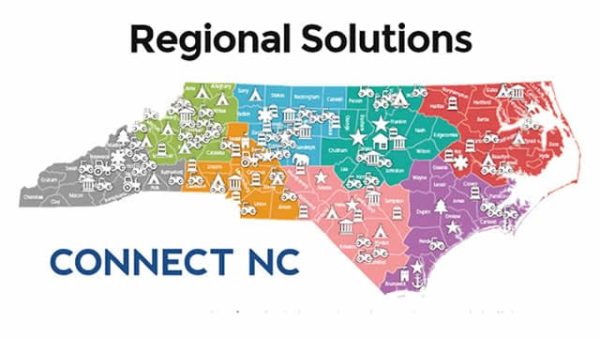Chancellor discusses bond package with community college officials

Chancellor Philip L. Dubois is touting the benefits of the $2 billion Connect NC bond package. At the invitation of Rowan-Cabarrus Community College President Carol Spalding, Dubois recently spoke to the RCCC Boards of Trustees and Foundation, local elected officials and community supporters.
Dubois, who is traveling around the region to promote the bond package, said $90 million in the bond issue is earmarked for a new science building at UNC Charlotte, which is vitally important to RCCC and the surrounding community. The bond measure is on the March 15, 2016, ballot statewide.
Each year, hundreds of RCCC students transfer into UNC Charlotte. Many of them will major in STEM (science, technology, engineering and mathematics) fields. Demand for science instruction at UNC Charlotte is directly related to enrollment growth, said Dubois at the meeting, held at the North Carolina Research Campus in Kannapolis.
Enrollment at UNC Charlotte has grown by 142 percent since the current science building was built in 1985. UNC Charlotte accounts for nearly half of the recent growth in the entire UNC system.
Without the new science building, Dubois said the University’s enrollment growth will be stopped in its tracks. The new science facility is crucial to ensuring continued growth and to meet strong demand for talent by Charlotte region employers.
“The business case for the bond package is simple,” Dubois told the group of assembled leaders. “No tax increase is needed to pay for the bonds, the debt service level is below the recommended amount to maintain the state’s triple ‘A’ bond rating, and interest rates are at historic lows.”
At the same meeting, RCCC announced a new agreement with UNC Charlotte to make transferring between the colleges much easier for some students.
When a comprehensive articulation agreement was signed in 2014 by the 16 North Carolina state colleges and universities and the 58 North Carolina community colleges, the Associate in Fine Arts (AFA) degree program was not included. Under Spalding’s leadership, RCCC began working with UNC Charlotte to ensure that RCCC AFA students would be able to transfer with ease along with their peers.
“Articulation agreements are complex and require a lot of work on both sides,” Spalding said. “I applaud our faculty for their leadership in making our AFA students a priority and ensuring their ability to transfer.”